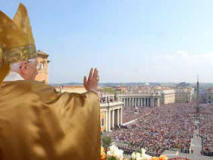|
Pope Benedict
XVI- Writings as Cardinal |
Papal primacy - the Power of
God Over Human Weakness
Joseph Cardinal Ratzinger

"…In order to understand the way in which Peter is a rock, a quality
he does not have of himself, it is useful to keep in mind how
Matthew continues the narrative. It was not by “flesh and blood” but
by the revelation of the Father that he had confessed Christ in the
name of the Twelve. When Jesus subsequently explains the figure and
destiny of the Christ in this world, prophesying death and
resurrection, it is flesh and blood that respond: Peter “scolds the
Lord”: “By no means shall this ever be” (16:22). To which Jesus
replies: “Be gone, behind me, Satan; you are a stumbling block (skandalon)
for me” (16:23). Left to his own resources, the one who by God’s
grace is permitted to be the bedrock is a stone on the path that
makes the foot stumble.
"The tension between the gift coming from the Lord and man’s own
capacity is rousingly portrayed in this scene, which is some sense
anticipates the entire drama of papal history. In this history we
repeatedly encounter two situations. On the one hand, the papacy
remains the foundation of the Church in virtue of a power that does
not derive from herself. At the same time, individual popes have
again and again become a scandal because of what they themselves are
as men, because they want to precede, not follow, Christ, because
they believe that they must determine by their own logic the path
that only Christ himself can decide: “You do not think God’s
thoughts, but man’s (Mt 16:23)…
…The Roman primacy is not an invention of the popes, but an
essential element of ecclesial unity that goes back to the Lord and
was developed faithfully in the nascent Church.
"But the New Testament shows us more than the formal aspect of a
structure; it also reveals to us the inward nature of this
structure…It depicts the tension between skandalon and rock;
in the very disproportion between man’s capacity and God’s sovereign
disposition, it reveals God to be the one who truly acts and is
present. If in the course of history the attribution of such
authority to men could repeatedly engender the not entirely
unfounded suspicion of human arrogation of power, not only the
promise of the New Testament but also the trajectory of that history
itself prove the opposite. The men in question are so glaringly, so
blatantly unequal to this function that the very empowerment of man
to be the rock makes evident how little it is they who sustain the
Church but God alone who does so, who does so more in spite of men
than through them. The mystery of the Cross is perhaps nowhere so
palpably present as in the primacy as a reality of Church history.
That its center is forgiveness is both its intrinsic condition and
the sign of the distinctive character of the God’s power…When the
Church adheres to these words in faith, she is not being
triumphalistic but humbly recognizing in wonder and thanksgiving the
victory of God over and through human weakness. Whoever deprives
these words of their force for fear of triumphalism or of human
usurpation of authority does not proclaim that God is greater but
diminishes him, since God demonstrates the power of his love, and
thus remains faithful to the law of the history of salvation,
precisely in the paradox of human impotence. For with the same
realism with which we declare today the sins of the popes and their
disproportion to the magnitude of their commission, we must also
acknowledge that Peter has repeatedly stood as the rock against
ideologies, against the dissolution of the word into the
plausibilities of a given time, against subjection to the powers of
this world.
"When we see this in the facts of history, we are not celebrating
men but praising the Lord, who does not abandon the Church and who
desired to manifest that he is the rock through Peter, the little
stumbling stone: “flesh and blood” do not save, but the Lord saves
through those who are of flesh and blood. To deny this truth is not
a plus of faith, not a plus of humility, but is to shrink from the
humility that recognizes God as he is. Therefore the Petrine promise
and its historical embodiment in Rome remain at the deepest level an
ever-renewed motive for joy: the powers of hell will not prevail
against it…"
Excerpted from Called to Communion, (c) 1991